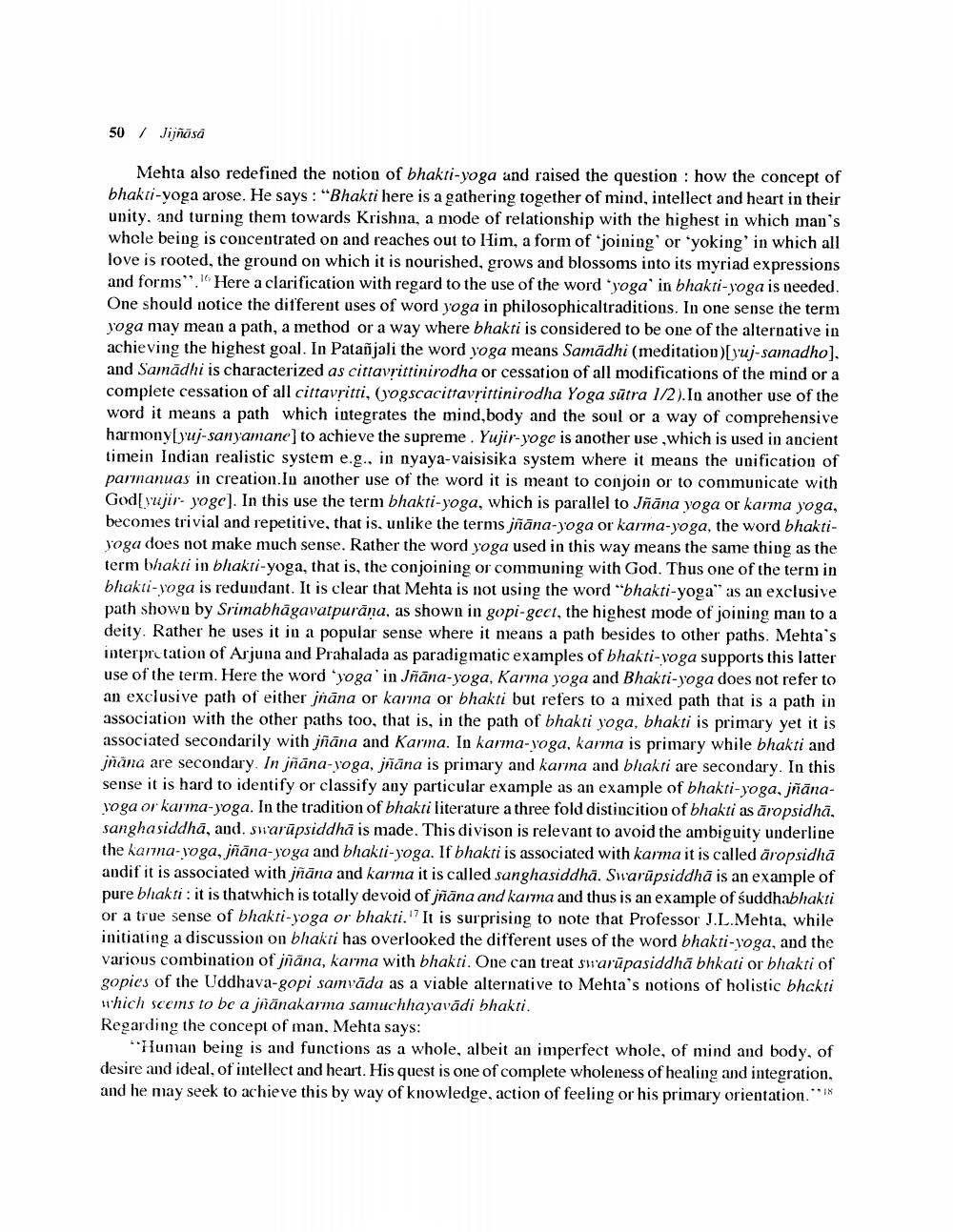________________
50
/
Jijnäsa
Mehta also redefined the notion of bhakti-yoga and raised the question : how the concept of bhakti-yoga arose. He says: "Bhakti here is a gathering together of mind, intellect and heart in their unity, and turning them towards Krishna, a mode of relationship with the highest in which man's whole being is concentrated on and reaches out to Him, a form of joining' or 'yoking' in which all love is rooted, the ground on which it is nourished, grows and blossoms into its myriad expressions and forms". Here a clarification with regard to the use of the word "yoga' in bhakti-yoga is needed. One should notice the different uses of word yoga in philosophicaltraditions. In one sense the term yoga may mean a path, a method or a way where bhakti is considered to be one of the alternative in achieving the highest goal. In Patañjali the word yoga means Samadhi (meditation)[yuj-samadho), and Samadhi is characterized as cittavrittinirodha or cessation of all modifications of the mind or a complete cessation of all cittavritti, (yogscacittavrittinirodha Yoga sūtra 1/2).In another use of the word it means a path which integrates the mind, body and the soul or a way of comprehensive harmony yuj-sanyamane) to achieve the supreme. Yujir-yogc is another use, which is used in ancient timein Indian realistic system e.g., in nyaya-vaisisika system where it means the unification of parmanuas in creation. In another use of the word it is meant to conjoin or to communicate with God[yujir- yogc). In this use the term bhakti-yoga, which is parallel to Jñana yoga or karma yoga, becomes trivial and repetitive, that is, unlike the terms jñāna-yoga or karma-yoga, the word bhaktiYoga does not make much sense. Rather the word yoga used in this way means the same thing as the term bhakti in bhakti-yoga, that is, the conjoining or communing with God. Thus one of the term in bhakti-yoga is redundant. It is clear that Mehta is not using the word "bhakti-yoga" as an exclusive path shown by Srimabhāgavatpurāna, as shown in gopi-gcct, the highest mode of joining man to a deity. Rather he uses it in a popular sense where it means a path besides to other paths. Mehta's interpretation of Arjuna and Prahalada as paradigmatic examples of bhakti-voga supports this latter use of the term. Here the word 'yoga' in Jñana-yoga, Karma yoga and Bhakti-yoga does not refer to an exclusive path of either jnana or karma or bhakti but refers to a mixed path that is a path in association with the other paths too, that is, in the path of bhakti yoga, bhakti is primary yet it is associated secondarily with jñana and Karma. In karma-yoga, karma is primary while bhakti and jnäna are secondary. In jnäna-yoga, jñäna is primary and karma and bhakti are secondary. In this sense it is hard to identify or classify any particular example as an example of bhakti-yoga, jñānayoga or karma-yoga. In the tradition of bhakti literature a three fold distincition of bhakti as āropsidhā, sanghasiddhā, and, swarūpsiddhā is made. This divison is relevant to avoid the ambiguity underline the karma-yoga, jñāna-yoga and bhakti-yoga. If bhakti is associated with karma it is called āropsidhā andif it is associated with inäna and karma it is called sanghasiddha. Swarüpsiddhā is an example of pure bhakti: it is thatwhich is totally devoid of jñāna and karma and thus is an example of suddhabhakti or a true sense of bhakti-yoga or bhakti.'? It is surprising to note that Professor J.L.Mehta, while initiating a discussion on bhakti has overlooked the different uses of the word bhakti-roga, and the various combination of jnana, karma with bhakti. One can treat sharūpasiddhä bhkati or bhakti of gopies of the Uddhava-gopi samvāda as a viable alternative to Mehta's notions of holistic bhakti which seems to be a jnanakarma samuchhayavādi bhakti. Regarding the concept of man, Mehta says:
"Human being is and functions as a whole, albeit an imperfect whole, of mind and body, of desire and ideal, of intellect and heart. His quest is one of complete wholeness of healing and integration, and he may seek to achieve this by way of knowledge, action of feeling or his primary orientation."




